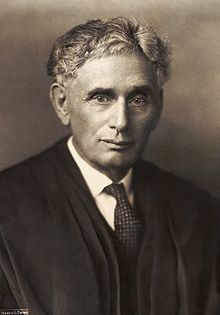
Louis Brandeis (1916-1939)
Lived from 1856 to 1941.
Early Life and Legal Career
Louis D. Brandeis was born in Louisville, Kentucky to Jewish immigrant parents. Brandeis attended Harvard Law School at the age of 18, graduating two years later with the highest grade point average in the school’s history. Brandeis was admitted to the Missouri bar in 1878. He accepted a job with a law firm in St. Louis, where he filed his first brief and published his first law review article. Seven months later, Brandeis tired of the minor casework. He accepted an offer by a former Harvard classmate, Samuel D. Warren, to set up their own law firm in Boston.
While waiting for the firm to gain clients, Brandeis was appointed law clerk to the chief justice of the Massachusetts Supreme Court, Horace Gray. He was admitted to the Massachusetts bar without taking examination. As an attorney, Brandeis is remembered for being a leader in the Progressive movement who used the law as a tool for social change. Nicknamed the “people’s lawyer,” Brandeis was notorious for refusing payment for public interest cases.
Appointment to the Supreme Court
Brandeis was nominated to the United States Supreme Court by President Woodrow Wilson on January 28, 1916. At the time, the nomination was so controversial that it resulted in the first public hearing regarding a Justice’s nomination. The controversy regarding the nomination most likely stemmed from conservative fears that Brandeis was too radical to serve as a Justice. Although it was believed that this radical ideology would inhibit his ability to give unbiased rulings, Brandeis’ nomination was eventually confirmed by the Senate with a 47-22 vote.
During his time on the bench, Brandeis took part in many influential cases. He is perhaps most remembered, however, for being a member of the “Three Musketeers”–a group of liberal Justices that opposed the conservative “Four Horseman” during the New Deal era. Brandeis’ last important judicial opinion, Erie Railroad Co. v. Tompkins, was also one of the most significant of his career. In Erie, the Supreme Court addressed the issue of whether federal judges should apply state or federal “general law” where the parties to a lawsuit are from different states. Ultimately, the Court overturned the ninety-six-year-old doctrine of Swift v. Tyson (1842), holding that there was no such thing as a “federal general common law” in cases involving diversity jurisdiction. This concept is now referred to as the Erie Doctrine.
Death
Brandeis retired from the Supreme Court on February 13, 1939 and died on October 5, 1941. His remains are buried beneath the portico of the Law School of the University of Louisville in Louisville, Kentucky.
Notable Cases
Erie Railroad Co. v. Tompkins (1938)
Gilbert v. Minnesota (1920)
Whitney v. California (1927)
Olmstead v. United States (1928)







